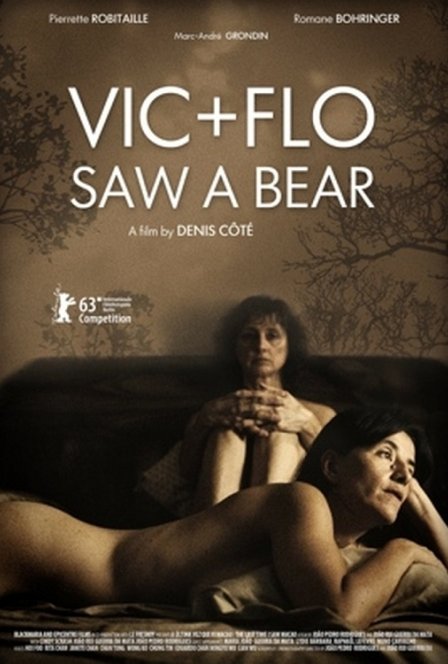Denis Côté, the French-Canadian director behind the stirring new film Vic + Flo Saw A Bear, has a fascination with cages. Last year, his experimental documentary Bestiaire (a categorization that Côté himself finds somewhat insufficient) hinted at the enigmatic inner lives of animals at a small Safari Park in Montreal. Vic + Flo Saw A Bear showcases a return to narrative style, telling the story of two lesbian ex-convicts living in an isolated setting; their tale is at times romantic but equally eerie, and has more than a few parallels to Bestiaire’s subtle themes of isolation, control, and abuse.
The story begins with Vic (Pierrette Robitaille), who has recently been released on parole from an unspecified sentence. Accompanied by a soundtrack of portentous, thunking drums, she arrives at a remote bus stop where two boys sit, one of them tooting hideously on a trumpet. Her response exhibits a typical combination of bluntness and decorum: “You can’t ask people for money if you don’t know how to play.”
Vic is there to foist herself upon her uncle Emile (Georges Molnar), who owns a piece of land and a now out-of-service sugar shack. Emile is a mute, wheelchair-bound invalid and receives basic care from a teenage neighbor, Charlot (Pier-Luc Funk), whose father may have designs on Emile’s property. Vic takes all of this in stride, abruptly taking over a bedroom, assuming responsibility for Emile’s care, and inviting her much-younger lover, Flo (Romane Bohringer) to stay with them indefinitely.
At first their arrangement is blissful, the pair careening around the surrounding area in a golf cart and doing pretty much whatever they want. The only hiccup is Vic’s parole officer, Guillaume (Marc-André Grondin). He, like Vic, is blunt but not necessarily cruel, and the women chafe a little under his watchful eye. He’s a red herring, though, in plot terms — the real issue is that Flo is restless and Vic is controlling, and they may be hiding things from one another. As they pass their days uneventfully, a hint of menace begins to creep into the story. When Flo nervously gestures towards the black woods, remarking “it’s like death out here,” Vic responds unsympathetically: “There’s no stress.”
Both lead actresses are striking, though in very different ways: Bohringer has long dark hair and a Charlotte Gainsbourg jawline, while Robitaille’s ostrich-like posture supports a pair of soulful eyes. Her lips are eternally pressed into a terse line, like an apparition of Whistler’s Mother; her Vic is calm but essentially fearful. Côté lets the film orbit around the relationship between the two women, which despite its flaws provides them with an anchor. And it’s a necessary anchor for us, too: Côté never over-explains anything, and the film is often mysterious regarding its themes of sexuality and obligation. Soon after a new character is introduced who turns out to have sinister ties to Flo’s past, there’s a short, unexplained scene in the yard of a women’s prison. We see prison guards hovering at attention, but the focus is more on the inmates’ conversations — conversations we can’t hear, much like we never learn the details of either Vic or Flo’s troubled histories.
Côté’s film, which won the Alfred Bauer Prize at the Berlin International Film Festival last year, thrives on that ambiguity and the isolated feeling it creates. The secondary characters are mostly one-dimensional — Jackie (who appears late in the film but plays a crucial role) is a villain, Guillaume is a stooge, and Emile is a ghost. But Côté’s portrait is also carefully tender at points. In many ways, the relationship between the two women exhibits a complex psychology of post-incarceration life. When Flo sustains an injury that requires her to wear a leg cast, she points out that Vic almost seems pleased by her lack of mobility. Thankfully, Robitaille and Bohringer carry the film with subtle expressiveness from its initial vagaries through the harrowing final ten minutes (and trust me when I say that it’s a uniquely shocking conclusion). What you make of that ending is entirely up to you, but it sticks in your throat like an unspoken word. Whatever the nature of the complex bonds between Vic, Flo, and the outside world, the idea that they are essentially real is hard to deny.

